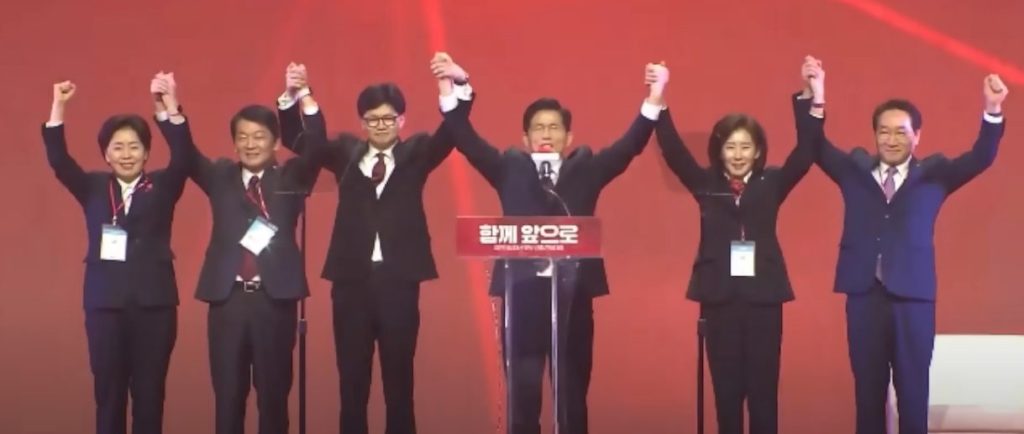South Korea’s Presidential Race Heats Up with Crypto Focus
The South Korean political landscape is about to experience a seismic shift as the ruling People Power Party (PPP) officially names former labor minister Kim Moon-soo as its candidate for the upcoming presidential election on June 3. As the nation grapples with the rapid rise of cryptocurrency, Kim’s candidacy could take the Bitcoin (BTC) conversation to new heights. Recent statistics suggest that around 16.3 million South Koreans have dabbled in cryptoassets, a staggering number that underscores the growing interest and market potential.

Why This Matters
The involvement of cryptocurrency in political debates is more than just political posturing; it represents a fundamental shift in how governments perceive and integrate new financial technologies. For many voters, especially the tech-savvy younger demographic, crypto is not just a speculative asset—it’s a way of life. Kim Moon-soo’s pro-crypto stance could have significant implications for market growth and regulatory frameworks moving forward.
Crypto as a National Strategy
Data from the South Korean media outlet Digital Daily reveals that the nation’s political factions are making substantial efforts to incorporate cryptocurrency pledges into their platforms. Kim’s recent declaration to allow major governmental entities like the National Pension Service (NPS)—the world’s third-largest pension fund—and the Korea Investment Corporation (KIC) to invest in virtual assets has caused quite a stir.
This potential for high-profile investments could serve to elevate the reputation and stability of the crypto market in South Korea. “Considering the changes in the domestic and international economic environment, we can no longer ignore virtual assets,” he stated, underscoring the urgency he feels towards adapting to cryptocurrency’s growing influence.
Kim’s Vision for a Stable Crypto Market
At a recent convention in Goyang, Kim made it clear that while many young Koreans are experiencing the financial success that can come with crypto investments, there are also significant risks involved. “Many young people are making money with virtual assets, but some are losing their investments as well. I will work to stabilize the market through institutional frameworks,” he promised, signaling his commitment to creating a safer environment for investors.
Rival Party’s Crypto Interests
The Democratic Party, the PPP’s main rival, is also keen to tap into the crypto enthusiasm that’s electrifying voters. Just like the PPP, they have proposed a series of policies aimed at supporting crypto adoption, including potential approval of Bitcoin exchange-traded funds (ETFs) and the establishment of a national strategic crypto reserve. The competition to win over the crypto-savvy electorate is fierce, with both parties vying to institutionalize and solidify their approaches to digital currencies.
Mixed Reactions from the Crypto Community
As candidates outline their plans, reactions from industry insiders have been mixed. Many are cautiously optimistic about the bipartisan push for pro-crypto policies. The overwhelming support from political leaders has generated a sense of hope in a community that has often been faced with restrictive regulations.
Nonetheless, skepticism remains due to the history of unfulfilled promises. Similar pledges were made during previous election cycles, only to result in minimal action post-election. “We’ve been disappointed before,” admitted an unnamed official from a leading crypto exchange, expressing both optimism for current proposals and skepticism about their follow-through.
Expert Opinions: What Analysts are Saying
Experts in the field are weighing in on the implications of these political pivots. One prominent analyst remarked, “If these governmental bodies begin investing in cryptocurrencies, it could usher in a new era of legitimacy for the entire sector. However, the real test will be not only whether these policies materialize but also how they can withstand the scrutiny of market volatility.”
Future Outlook: What Lies Ahead?
As South Koreans head to the polls, the crypto landscape hangs in the balance. With both the PPP and the Democratic Party outlining aggressive crypto policies, observers are eager to see which candidate will capture the electorate’s imagination and regulatory support simultaneously. The true potential of this election could redefine the role of cryptocurrencies in South Korea’s financial future.
Conclusion: Engage and Discuss
As we anticipate the outcome of the South Korean presidential election, the crypto community will be watching closely. Will Kim Moon-soo’s pro-crypto policies become a reality, or will they fade away after the election? The future is uncertain, and we encourage you to share your thoughts in the comments below. How do you see the relationship between politics and cryptocurrency evolving in your country?

